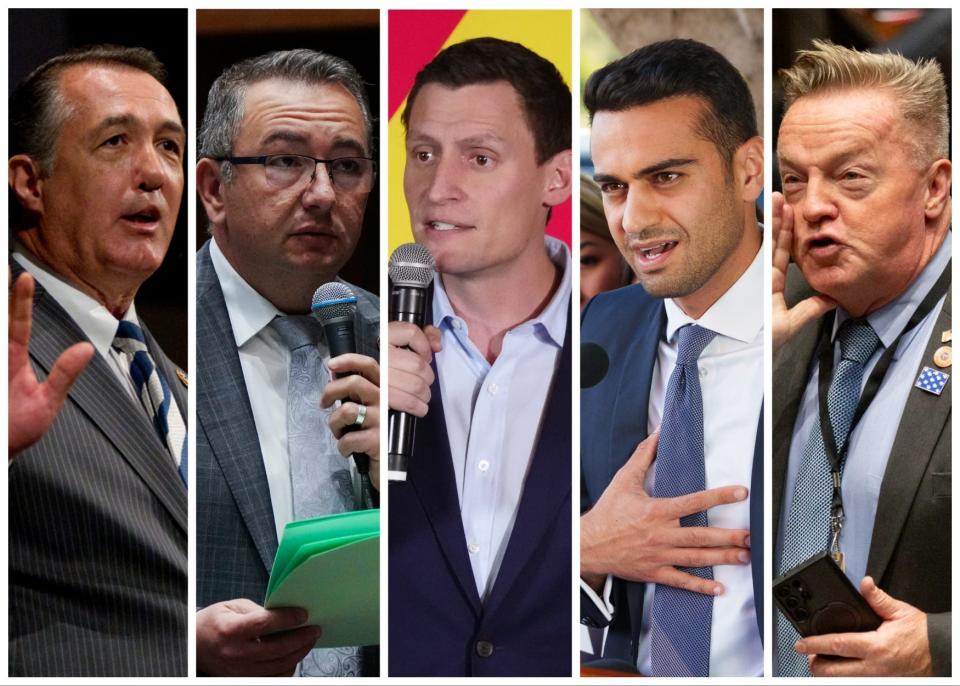What kind of Republican candidate do Arizonans want? Key primaries to shape fall ballot
- Oops!Something went wrong.Please try again later.
- Oops!Something went wrong.Please try again later.
At the July 30 primary, voters will nominate candidates to represent their political parties at a number of levels, from Congress to county government.
These are intraparty contests and will set the stage for the Nov. 5 ballot. They'll offer a preview of what Arizona Republicans are looking for ahead of a crucial election.
The races range from congressional contests where candidates seek to convince voters of their loyalty to former President Donald Trump to a contest for the top election official job in Arizona's largest county, where the GOP incumbent has regularly sparred with the Trump wing of the party.
Here’s rundown of some of the key primary races.
Congressional District 8
A crowded field of Republicans in the West Valley-area 8th Congressional District is running to replace the outgoing U.S. Rep. Debbie Lesko, R-Ariz.
The race has pitted former campaign allies against each other and shows growing disagreement within the GOP about how to govern.
Sparks are flying between former Arizona attorney general candidate Abe Hamadeh, who has received Trump’s coveted endorsement, and former U.S. Senate candidate Blake Masters, whose multimillion-dollar personal loan has left him with by far the most campaign cash.
The two campaigned together while they ran for statewide office in 2022, both with Trump’s endorsement. Now they are at each other's throats with growing political and personal attacks.
The feud intensified when leaked screenshots showed that Hamadeh, who continues to publicly contest his 2022 election loss, privately called those who believe stolen election claims "crazies" in January 2023 text messages to Masters. Hamadeh’s campaign has claimed he was jokingly using the term.

Other candidates differ in the way they would approach the job of a U.S. congressman. Arizona state Sen. Anthony Kern, R-Glendale, one of Arizona’s recently indicted fake electors, has backed a hardline approach to governing, saying he would put highly conservative priorities above party unity or compromise. Arizona House Speaker Ben Toma, R-Glendale, thinks that strategy has set the party back and has touted his record of passing major legislation with a single-seat majority.
Former U.S. Rep. Trent Franks, who resigned from the seat amid a scandal in 2017, has stayed mostly above the fray. He has apologized for the controversy that ended his time in office and emphasized his staunchly anti-abortion stance.
Also in the race is Patrick “Pat” Briody, a lesser-known candidate who describes himself as a constitutionalist and conservative.
Because the district is solidly Republican, whoever wins is expected to coast to an easy victory against Democrat Gregory Whitten.
Congressional District 2
In the 2nd Congressional District, which stretches across much of northeastern Arizona, one of Arizona’s newest members of Congress is fending off a challenge from within his own party.
Freshman Rep. Eli Crane, R-Ariz., sent waves through D.C. when he voted to oust Rep. Kevin McCarthy, R-Calif., from the House’s top leadership post. Now, former Yavapai County Supervisor Jack Smith is challenging Crane in the July 30 primary, in an effort that McCarthy’s allies have begun supporting financially.
The two candidates have sparred over their level of allegiance to McCarthy. Smith has argued Crane's speakership votes were a betrayal of the Republican Party and said he would take a more “traditional” approach to governing. Crane in turn has cast Smith as an opportunist bankrolled by the D.C. “Swamp,” though Crane himself accepted money from McCarthy while running against a Democrat in 2022.

There isn't much daylight between the candidates when it comes to policy. Both Crane and Smith emphasize familiar conservative priorities around illegal immigration, U.S. elections security, and the size and scope of the federal government.
Instead, Smith’s campaign has focused on the fact that Crane lives in Oro Valley, a well-to-do suburb outside Tucson and far beyond the limits of the district, and his votes against bills that included border funding. Crane has countered that he voted against those bills because they did not go far enough to address his concerns about immigration.
Whoever wins will face former Navajo Nation President Jonathan Nez in the November general election. Though in a district that leans Republican, Nez’s candidacy is widely seen as a longshot.
Legislative District 1, Senate race
This is a three-way race, with two far-right Republicans looking to knock off incumbent state Sen. Ken Bennett.
Bennett is a former state Senate president and Arizona secretary of state. He returned to the Senate in 2022 and has been the pivotal vote in the closely divided Senate, using his position to try and moderate, and at times, kill measures. He was influential in the passage of HCR 2060, a border control ballot measure voters will see this fall. Bennett worked to ensure the measure focused on the people who law enforcement witness crossing the border illegally, seeking to avoid a repeat of Arizona’s experience a decade ago with SB 1070, which led to people statewide being racially profiled.
Mark Finchem, who represented a southern Arizona district two years ago, moved to Prescott after his 2022 loss for Arizona secretary of state. He is an election denier, making a name for himself in the wake of the 2020 presidential election, which he argues was stolen. He sued to try and overturn his own loss in 2022, but lost those efforts and now is ordered to pay attorney fees. He is endorsed by Donald Trump and is running as an “America First” candidate.
Steve Zipperman, who lost to Bennett two years ago by 256 votes, is running as a constitutional conservative. He says the July 30 primary in Yavapai County is more important than the general election.
That’s because whoever wins the primary will help shape the direction of the GOP Senate caucus, and is an oblique reference to Bennett’s often moderating influence. Zipperman has questioned his 2022 loss and argues the law should be changed to allow a judge to order a new election without a challenger first proving there were problems with the conduct of the election.
Legislative District 2, Senate race
Sen. Shawnna Bolick and Josh Barnett are facing off in a primary race that presents voters with a stark contrast on one of the biggest issues of the year: Abortion rights.
Both conservatives cast themselves as pro-life, but they differ on where they draw the line. Bolick bucked her party in May and voted to repeal the state’s Civil War-era abortion law, which made almost all abortions illegal and levied penalties on anyone who assisted in an abortion. She delivered a long and deeply personal speech explaining her vote, citing issues with her own pregnancies that would have been illegal if the 1864 law were in place at the time. Bolick was a co-sponsor of the 2022 law that barred abortions after 15 weeks of pregnancy.

Barnett has criticized Bolick for voting with the Democrats to repeal the abortion law and then taking an Italian vacation in the middle of the legislative session. He turned to social media to fundraise off her vote, complaining that Bolick blocked public comment on her social media sites even though she “went on to filibuster her own vote for 15 minutes.”
Bolick served one term in the state House, and then made an unsuccessful bid in 2022 for the GOP nomination for secretary of state. She was appointed to the state Senate last year to fill a vacancy. As of mid-April, she had nearly $114,000 in her campaign treasury.
Barnett ran unsuccessfully for the GOP nomination in Congressional District 1. After he lost, he filed an unsuccessful legal complaint to have the primary election results annulled. He has filed to run under Arizona’s public campaign finance program. As of mid-April, he had less than $900 in his account.
Legislative District 17, Senate race
One of the most closely watched primary elections in 2024 is a rematch of the 2022 race in which Justine Wadsack pulled off a surprise win over incumbent Vince Leach.
But this time, it is a head-to-head fight between the two. In 2022, there was a third candidate in the race, which split the vote and gave Wadsack the win.
Wadsack has cut a colorful and controversial profile in her first term as a senator, emerging as an unapologetic fighter in the culture wars. Leach is now running ads highlighting her numerous public and social media comments under the banner of “something’s weird about Justine Wadsack.”
Her legislative successes reflect a more moderate stance. She was key to the resolution of a water crisis last year that affected the Rio Verde area, an exurban outpost far from her Tucson-based district. She’s advocated for child welfare policies to keep kids safe and had a bill signed that provides more services for individuals classified as seriously mentally ill.
Leach is cut from the traditional conservative Republican mold, a staunch advocate for the business community, lower taxes and fewer regulations. He is leaning on his experience at the statehouse, where he served as a member of the House before moving to the Sente for two terms.
In 2022, he challenged Wadsack’s claim to be a resident of LD 17, producing numerous documents that threw doubt on her insistence that she lived in a friend’s spare room after moving out of her central Tucson home, which was in a different district. However, a Superior Court judge did not buy the arguments and allowed her to remain on the ballot.
Democrats view the outcome of this primary as key to their hopes of taking control of the Senate. They see Wadsack as vulnerable in a general election, noting she beat her Democratic opponent in 2022 by a slim margin.
Maricopa County Board of Supervisors, District 2
County supervisors statewide are tasked with setting a vision and direction for their region, allocating government monies, certifying election results and more. But in populous Maricopa County, where supervisors recently drew national attention for withstanding election challenges from Trump and his allies, the positions are pivotal. All of the board’s five seats are up for election, but much of the fight in the primary will be centered on bright-red District 2, which encompasses parts of Scottsdale, Cave Creek, Fountain Hills, Paradise Valley, Mesa and Gilbert.
There, two Republicans — sitting Supervisor Tom Galvin and former state lawmaker Michelle Ugenti-Rita — are duking it out for a shot at the general ballot. Galvin, a land use attorney who previously worked as a policy advisor at the Arizona Corporation Commission, was appointed to his seat in 2021 and won his first election the following year. Ugenti-Rita, who previously worked in commercial real estate, was notably sharp-tongued and unafraid of controversy during her time in the Arizona Legislature. She followed up her statehouse tenure with an unsuccessful run for secretary of state in 2022.
Galvin’s campaign is rooted in his image as a principled conservative who prioritizes funding public safety, maintaining a friendly business climate and protecting private property rights. Ugenti-Rita seeks to cast him as a weak Republican who has failed to build trust in elections and amicably resolve a water crisis in a county community last year. She pledges to reduce county spending and improve election administration. On the financial side of things, Galvin has handily outraised Ugenti-Rita.
Whoever wins will face Democrat Julie Cieniawski, a school board member and former teacher, in November. But the heavily conservative district is unlikely to turn blue at the end of the year, making the primary the true contest for the seat.
Maricopa County recorder
County recorders are statutorily tasked with managing public records, such as property documents. But the seat is perhaps best known for the tremendous power it holds over voter registration and early voting.
In Maricopa County, the pivotal position is headed for a three-way primary showdown. State lawmaker Justin Heap and information technology professional Don Hiatt are both challenging incumbent Stephen Richer for the Republican nomination. All are running on platforms of election integrity — but in practice, their plans look very different.
Richer, elected in 2020, touts his efforts to clean voter rolls and improve chain of custody documentation during his time in office. Along the way, he's established himself as a staunch defender of the county's elections and has pushed back on voting conspiracies and misinformation. He says he's also made improvements on the non-elections side of the house, unveiling a free service to fight title fraud last year and improving customer service.
Heap and Hiatt both voice issues with county elections. Heap, who has previously supported legislation to remove Arizona from a multistate voter registration list maintenance effort, pledges to clean voter rolls. He also promises faster election results, although his campaign website doesn't specify how he would accomplish that within the framework of existing state law. Hiatt also commits to cleaning voter rolls and says he would publicly release election-related data, including detailed logs from machines that tally votes. Heap's campaign website mentions nothing about the recorder's non-election duties. Hiatt says he would streamline processes for records management.
Whoever wins out will face Democrat Tim Stringham, an attorney and a Navy Reserve officer, in the general election. That race is also expected to center on election administration and the future of democracy in Arizona.
Reach the reporter at laura.gersony@arizonarepublic.com.
Reach the reporter at maryjo.pitzl@arizonarepublic.com or at 602-228-7566 and follow her on Threads as well as on X, the platform formerly known as Twitter @maryjpitzl.
Reach the reporter at rstern@arizonarepublic.com or 480-276-3237. Follow him on X @raystern.
Sasha Hupka covers county government and election administration for The Arizona Republic. Reach her at sasha.hupka@arizonarepublic.com. Follow her on X, formerly Twitter: @SashaHupka. Follow her on Instagram or Threads: @sashahupkasnaps.
See all 2024 Arizona primary races
A recap of everything: When is Arizona's primary? Election day is July 30. Here is a voter guide to help you learn about all the candidates.
This article originally appeared on Arizona Republic: Arizona GOP primaries to shape Republican ballot in 2024


